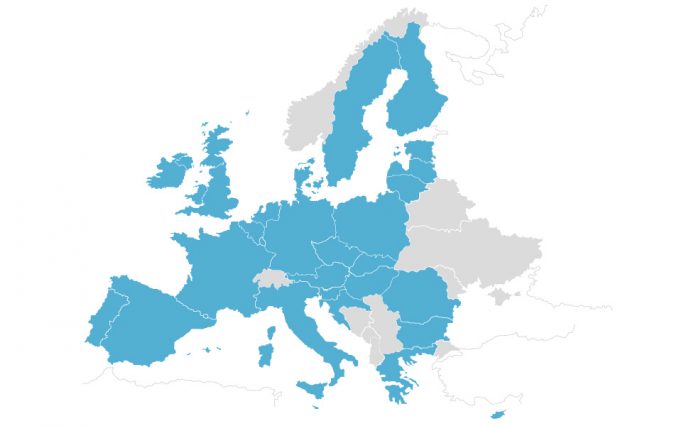By Bonnie Berkowitz
On 26 May 2019, Felix Klein, the German government’s Commissioner on Anti-Semitism suggested that Jews should not always wear the traditional Kippah cap in public, due to the increase in anti-Jewish attacks by far-right extremists.
The Israeli President Reuven Rivlin expressed his “shock” at Klein’s remarks, accusing the “German government of bowing to those targeting Jews”. This marks a dangerous departure for the escalating phenomenon of antisemitism, with the first official statement targeting Jewish appearance and using physical identification, which is reminiscent of the targeting of Jews, with the Yellow Star of David, prior to and during the Holocaust. Consequently, we have to interrogate if this targeting is isolated to Jews and question whether the rise of far-right extremism being taken seriously.
On 22 July 2011, the far-right extremist, Anders Breivik, killed 77 young people on the Island of Utoya in Norway, where a multicultural youth camp was being convened. Europeans were ‘surprised’ at what had happened, and initially attempts were made to prosecute Breivik as an ‘insane’ man undertaking a ‘once-off’ massacre. However, on appeal Breivik was deemed sane and convicted. In his own defence, Breivik spoke of belonging to a collective “we” when referring to his links with other far-right groups, like the English Defence League.
Breivik stated that his acts were a declaration of war against “multiculturalism” and the protection of European “culture”. On 27 July 2011, the BBC reported that the Italian Member of the European Parliament (MEP), Francesco Speroni, of the right wing Lega Nord, said that: “Breivik’s ideas are in defence of western civilisation.” Europe was already changing and incidences like these were not being taken seriously enough. Similarly, sentiments and acts of anti-Semitism were increasing, fuelled by extremists. The mainstream downplayed this phenomenon and believed that the institutions of liberal democracy would contain the spread of far-right extremism.
Continental Europe was dealing with the violence of radical Islamic extremist groups like, ISIS/ISIL, which distracted decisions-makers, Interpol, security agencies, and observers from the expansion of the far right in Europe. In addition, the 2008/9 economic crisis damaged the economies of many European countries.
Meanwhile, an influx of economic immigrants traversed from the Eastern Europe to Western Europe. Refugees facing the devastation of war, like Jewish refugees in the Second World War, came from the Middle East, Syria, Iraq, Afghanistan, and North Africa.
Cas Mudde, of the Centre for the Radical Right (CARR), suggests that “the far right’s “mythological” Aryan Europe was now being fragmented by the influx of these refugees who created a multi-cultural society and who took jobs away from “real Europeans”. Mudde notes that those “other” rather than “real Europeans” were being identified, thus as a result, the far right and far right populist culture started to slowly seep into everyday politics, growing steadily over the years, some of which has been disguised by being “euro-sceptics” and “nationalist politics”. In Hannah Arendt’s important book, Banality of Evil, she warns of how easily evil can becomes normalised in ordinary society.
Following the last EU Parliamentary elections, held from 26 to 28 May 2019, the general sentiment was that far- right and Eurosceptic parties had not gained that much, however this was contradicted by the analysis.
The EU Parliamentary elections were a mixed bag for far-right parties, with some gaining and other loosing votes. The largest percentage increases were in Italy, with a 33% of the total vote for the Far Rights, followed by Sweden (15%), Finland (13%), Slovakia (12%), Belgium (11%), Germany (10%) and Spain (6%), according to the European Parliament.
However, a number of countries also saw a decrease or a retention of their previous percentage of the overall votes for the far-right parties including: France with a 23%, Austria (17%), and Denmark (10%). Consequently, it is important to acknowledge that while the trend towards an increase in votes for far-right parties might show a variation among individual nation-states, the net effect across Europe amounts to a significant increase of the far-rights political representation within the European Union’s Parliament.
On 8 April 2019, the leader of the Italian Lega Nord, Salvini, declared the launch of a new right-wing populist alliance to be known as the European Alliance for Peoples and Nations (EAPN), and composed of 10 parties from a cross-section of nations, whose objectives are to push-back against immigration and multiculturalism, ideas espoused by Breivik in 2011. The coalescing of this far-right formation, would make it the fourth largest political formation in the EU Parliament. The EAPN may not yet be in a position to alter the decision-making power, but it demonstrates the increasing and significant shift towards far-right populism among ‘ordinary’ European voters. While democracy should always be considered a moral good, when it unleashes the forces of intolerance and promotes policies that go against the central principles of fairness and inclusivity, then it is time for citizens to wake up and question who, and what they are voting for!
Far-right political ideology gives license to those who are prepared to commit acts of aggression and violence against innocent people wearing Kippot, or those who have brown skin. Concretely, we all need to contribute to raising awareness, before it becomes too late – whether it is in the work-place, places of worship, schools, universities and in our communities. We also need to conduct research and training, to equip ourselves with knowledge of the origin and effects of the forces of intolerance on the lives of innocent people.
As citizens of the world, we need to stand up and be counted, and recognise the warnings from history. As the eminent philosopher, George Santayana warned us, “those who forget their history are condemned to repeat it.”
Bonnie Berkowitz is an Independent Researcher and a former Lecturer at the University of Western Cape, Cape Town, South Africa
To read the full PDF of the Cape Jewish Chronicle, click here
To read the editor’s column for August, click here
To read our most popular story for July, click here











